AACR ANNUAL MEETING 2018: DRIVING INNOVATION FOR PATIENTS
The AACR Annual Meeting sets the research agenda for the individuals and institutions working across the full spectrum of basic, translational, and clinical science to prevent and cure cancer. For the sixth consecutive year, the meeting hosted a record number of attendees; the AACR welcomed more than 22,500 scientists, clinicians, other health care professionals, survivors, patients, and advocates to Chicago to share and discuss the latest breakthroughs in cancer science. With its expanding audience and broad scientific focus, the Annual Meeting has become the forum of choice for thought leaders in the cancer research community.
WELCOMING THE NEW DIRECTOR OF THE NATIONAL CANCER INSTITUTE (NCI)
Six months after being sworn in as the 15th director of the NCI, Norman E. Sharpless, MD, FAACR chose the AACR Annual Meeting 2018 as the forum for his first major public address. Reporting to AACR members and other meeting attendees on the results of his listening tour of the National Cancer Program, Dr. Sharpless discussed four key areas of focus for the NCI that will catalyze progress against cancer:
- Workforce Training and Development. Support the cancer research enterprise by fostering a diverse and talented cancer workforce.
- Basic Science. Reaffirm the NCI’s commitment to basic science to drive novel approaches and technologies.
- Big Data. Increase data aggregation and interpretation to accelerate research and improve patient care.
- Clinical Trials. Fully realize the power of clinical trials through innovative design, administration, and analyses.
After his address, Dr. Sharpless joined AACR Immediate Past President Michael A. Caligiuri, MD, FAACR, and AACR President Elizabeth M. Jaffee, MD, FAACR, for a “fireside chat” to discuss the key focus areas in more detail and take questions from the audience.
“Progress and Promise” in Chicago
The AACR Annual Meeting brings together all stakeholders in the cancer research enterprise to share the latest advances in cancer research and treatment; for the third consecutive year, the AACR brought these advances to the local community. The AACR partnered with the Chicago Tribune Prime Expo to present “Progress and Promise against Cancer,” an educational event for residents in the Chicago area.
Moderated by incoming AACR President Elizabeth M. Jaffee, MD, FAACR, the event featured leading experts in cancer research discussing the current state of cancer prevention and interception and breakthroughs in cancer treatment—specifically, precision medicine and immunotherapy. The event concluded with a panel of patient advocates who placed these advances into the context of their own cancer journeys.
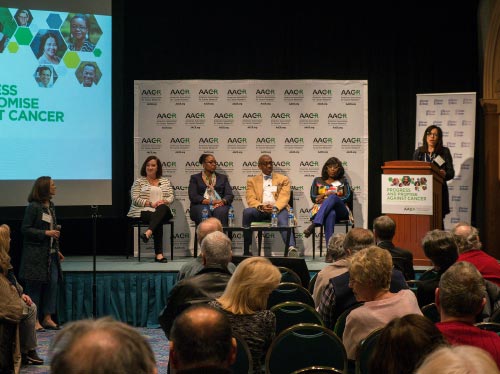
AACR Annual Meeting 2018: Innovative Cancer Science
The theme of the AACR Annual Meeting 2018, Driving Innovative Cancer Science to Patient Care, emphasized how progress against cancer is driven by discoveries in all areas of cancer research and the cancer-related sciences. The program for the meeting, which featured the latest advances across the cancer research continuum, was developed with the goal of catalyzing new breakthroughs for patients.
Highlights of the cutting-edge research presented at the meeting were summarized by AACR experts in a wrap-up plenary session.
The first presenter, Avrum E. Spira, MD, MSc, gave an overview of some of the cancer prevention, early detection, and interception research reported at the meeting. He opened by focusing on two presentations about efforts to create a precancer atlas similar to The Cancer Genome Atlas but in premalignancy for squamous cell lung cancer and multiple myeloma. He explained that the information gained from these studies about the earliest cellular and molecular events leading to invasive cancer could identify new approaches to prevention and early detection. Dr. Spira then discussed early promising data from clinical trials testing immunoprevention approaches in patients with either colonic polyps or ductal carcinoma in situ and studies using liquid biopsies for early detection of cancer. Lastly, Dr. Spira highlighted the challenges facing cancer survivors that were discussed in a special cancer survivorship session held in memory of Fellow of the AACR Academy Jimmie C. Holland, MD, FAACR.

Elaine R. Mardis, PhD, 2018-2019 AACR President-Elect, discussed key basic science research presentations with a focus on those showing how new technologies and computational analysis approaches are significantly increasing our understanding of cancer. Dr. Mardis, who was also chair of the 2018 Annual Meeting Program Committee, highlighted presentations outlining how next-generation sequencing is deepening our knowledge of the cancer genome and epigenome, how liquid biopsies are being used to understand how cancers become resistant to treatment over time, and how advanced technologies are being used to study the molecular characteristics of individual cells in a tumor—including cancer cells, immune cells, and other cells in the tumor microenvironment. She also summarized two presentations on the use of systems biology approaches to model cancer, which have yielded new insights into cancer biology and identified potential new combination treatments. Dr. Mardis concluded by reminding the audience that as technological advances continue to drive progress in basic cancer science, we will see further application of precision cancer medicine and better outcomes for patients.
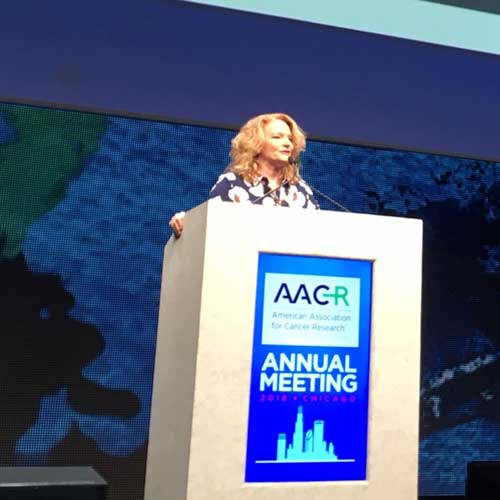
Michael A. Caligiuri, MD, FAACR, AACR President 2017–2018, highlighted some of the groundbreaking clinical research presented at the meeting. He began by discussing two potentially practice-changing phase III clinical trials testing immunotherapeutics called checkpoint inhibitors as initial treatment for metastatic non–small cell lung cancer. Results from the first trial, KEYNOTE-189, showed that adding the checkpoint inhibitor pembrolizumab to chemotherapy significantly improved overall survival, and results from the second trial, CheckMate-227, showed that patients who received two checkpoint inhibitors—nivolumab plus ipilimumab—had significantly longer progression-free survival compared with those who received chemotherapy. Dr. Caligiuri then highlighted several presentations about clinical trials testing molecularly targeted therapeutics, including the ARROW trial of BLU-667 for RET-altered cancers, the EORTC 90101 trial of crizotinib for ALK-altered inflammatory myofibroblastic tumor, and biomarker data from the PALOMA-3 trial of palbociclib for HER2-negative breast cancer. Throughout his presentation, Dr. Caligiuri emphasized how identifying biomarkers of response is essential if we are to optimize the use of immunotherapeutics and molecularly targeted therapeutics—and to move these revolutionary therapeutics to earlier lines of treatment in a safe and effective way.
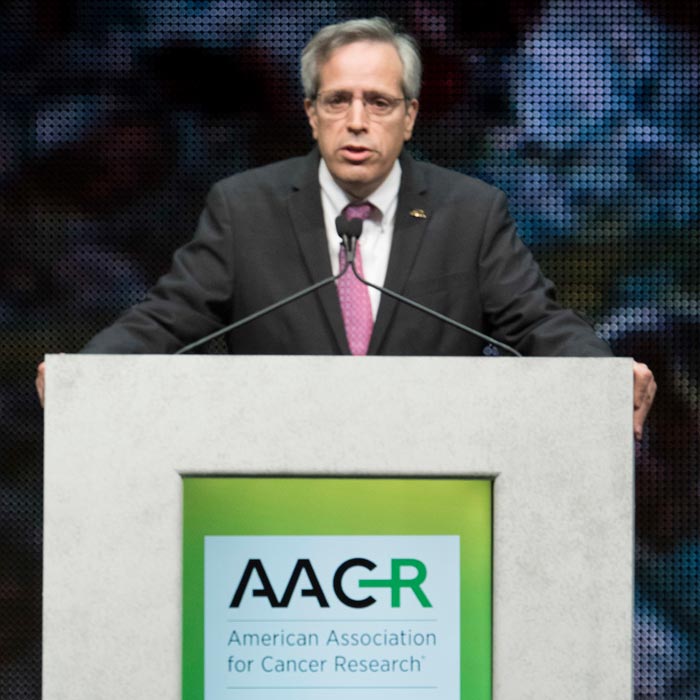
Elizabeth M. Jaffee, MD, FAACR, AACR President 2018–2019, concluded the session by explaining that despite the incredible advances we are making against the collection of diseases we call cancer, they remain a global challenge. She then highlighted several cutting-edge areas of research that she believes will ignite quantum leaps forward, including convergence science, implementation and behavioral sciences, and survivorship research. She also emphasized the importance of enhancing support for early- and mid-career cancer researchers, in particular female and minority cancer researchers, in order to accelerate the pace of scientific and clinical progress.
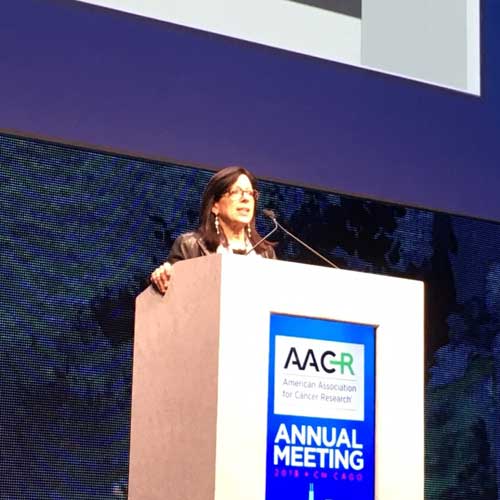
Annual Meeting
2018 At
A Glance
22,500
People attended the meeting. The Annual Meeting 2018 was the largest in the history of the AACR.
69
Countries were represented at the meeting.
6,328
Proffered papers were accepted for presentation in poster sessions or minisymposia. A total of 27 of these papers were selected for presentation in poster discussion sessions; this new type of session provided the presenters of highly-rated posters with an opportunity to share their work in a brief oral presentation.
253
Scientific sessions highlighted the latest in innovative basic, translational, and clinical cancer science—including 44 major symposia, five plenary sessions, and 47 educational sessions. The program included three “Unsolved Mysteries” sessions; these sessions brought together experts to address some of the major challenges in cancer research, such as the problem of cancer cachexia, the failure to translate IGF-1R and PI3K inhibitors into effective treatments, and how the age of patients at the time of cancer diagnosis impacts cancer genomics and drug development.
7
Panelists participated in a special session titled “The Cancer Survivorship Landscape: Potential Focus Areas for the Future.” Chaired by Anna D. Barker, PhD, the session was presented in memory of Jimmie C. Holland, MD, FAACR, a 20-year AACR member and pioneer in the field of psycho-oncology who died in December 2017. The panelists represented the entire continuum from cancer research to cancer care and patient advocacy, and they addressed several issues affecting cancer survivors, including the psychosocial and lifestyle aspects of cancer survivorship; concerns regarding the development of second malignancies; and challenges such as comorbidities and the toxicities resulting from current and prior treatments.
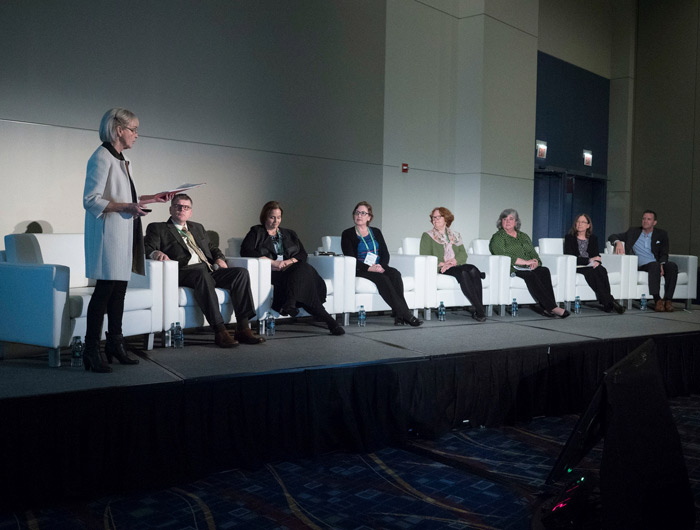
167
Clinical trials were presented, the largest number of trials ever presented at an AACR Annual Meeting. Several high-impact trials were presented in special sessions, including two trials that received significant media coverage for their practice-changing results that demonstrate the potential of cancer immunotherapy:
- According to data from the phase III trial KEYNOTE-189, treatment with pembrolizumab in combination with chemotherapy improved the overall response rate in patients with metastatic nonsquamous non-small cell lung cancer, reducing by half the risk of death for previously untreated patients. These results set the stage for pembrolizumab to become a standard treatment for patients with non–small cell lung cancer (NSCLC).
- Results from another phase III trial (CheckMate-227) demonstrated that, among patients newly diagnosed with advanced NSCLC with high tumor mutational burden (TMB), those who received nivolumab plus ipilimumab had significantly improved progression-free survival compared with patients who received the standard-of-care chemotherapy. These data could establish the combination of nivolumab plus ipilimumab as a first-line treatment option for patients with high-TMB NSCLC.
33
Recent Advances sessions were presented at the meeting to provide attendees with the latest updates in critical areas of research. In addition to sessions on organ sites, diagnostics and therapeutics, and cancer prevention, the program featured sessions on Recent Advances in Cancer Health Disparities Research. These sessions—which were added to the program by 2017-2018 AACR President Michael Caligiuri, MD, as part of his presidential initiative to highlight the issue of cancer health disparities—focused on the scientific questions that must be answered to ensure that all patients benefit from breakthroughs in cancer treatment regardless of race or socioeconomic status.
AACR Annual Meeting 2018: Media Coverage
The AACR Annual Meeting 2018 generated global interest, as the innovative cancer science presented in Washington produced a significant amount of news coverage and social media activity.
33
News releases were distributed.
185
Reporters registered to cover the meeting.
2,666
Media mentions were generated.
21,592
People viewed the AACR’s Facebook Live broadcasts during the Annual Meeting. The AACR conducted seven live broadcasts during the meeting, including a discussion of important science presented at the meeting. 2017-2018 AACR President Michael A. Caligiuri, MD, FAACR hosted the broadcast, which featured Annual Meeting Program Chair Elaine R. Mardis, PhD.
40,482
Tweets mentioned the #aacr18 hashtag.
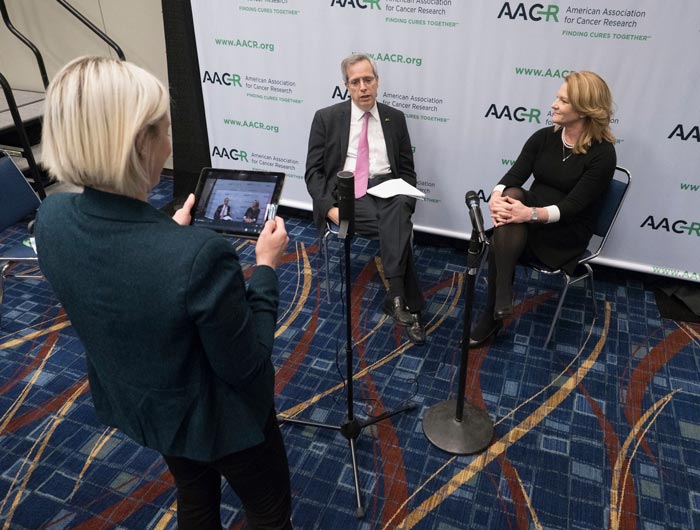
10,324
Unique users joined the Annual Meeting conversation on Twitter.
500
Number of followers for the @AACRPres Twitter account. The AACR launched the social media account during the Annual Business Meeting of Members, when Elizabeth M. Jaffee, MD, FAACR, began her term as President. The account offers followers a perspective on the unique experience of serving as President of the AACR.
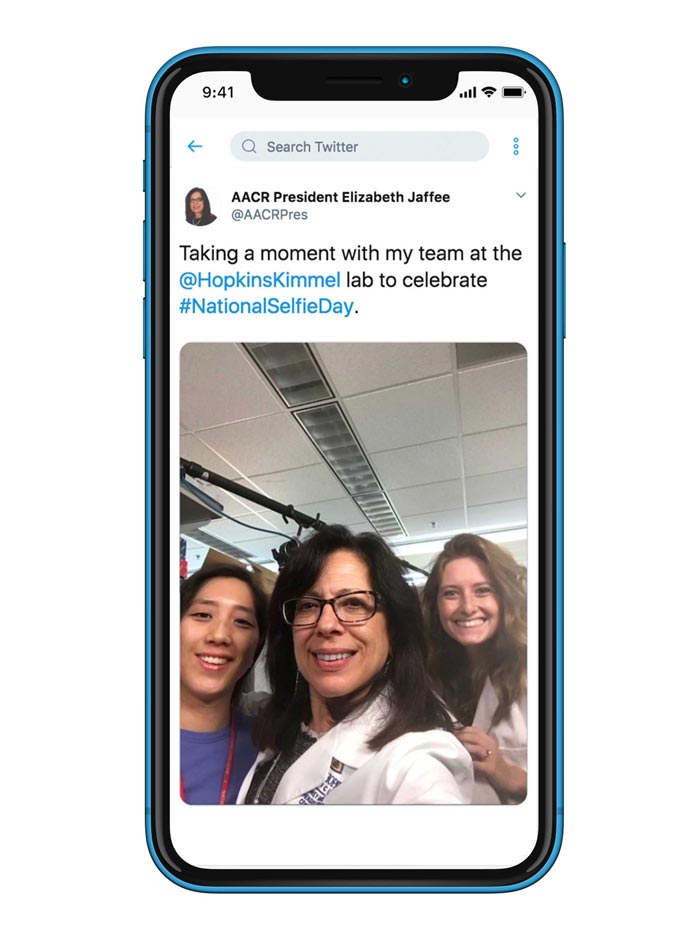
Among the many news organizations covering the Annual Meeting were the following major media outlets:








